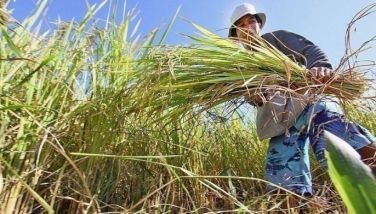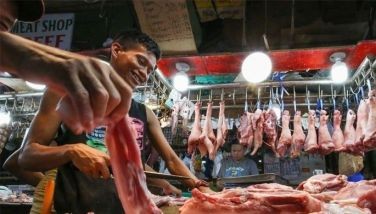In search of sustainable systems
September 4, 2005 | 12:00am
National politicians and many interested individuals and groups met recently with independent scientists from four continents to discusss strategies for changing agriculture worldwide to a diversity of locally based sustainable systems, a situation that can provide food sovereignty to all and protect the Earth from global warming.
The occasion was the Sustainable World Global Initiative’s first International conference organized by the Institute of Science in Society (ISIS), starting in the United Kingdom Parliament to a near capacity audience from Scotland, Wales, Ireland, Belgium, Australia and South Africa.
The need to move away from large-scales high input industrial monocultures has long been accepted by many people as being essential for providing livelihoods to the many millions of small farmers in the South and the relatively few farmers remaining in the North who are also responsible for conserving the plant and animal genetic diversity that have been decimated by decades of industrial monocultures, is showing all the signs of failing under global warning, and water and oil, on which industrial monocultures are heavily dependent and are both rapidly depleting.
Policies promoting food export and contravening human rights in the South also exacerbate global warming by adding food miles – or worse encouraging "food swaps" – shipment of the same food commodities as milk and met across the globe. World cereal yields from conventional industrial agriculture have been decreasing for four years in a row.
So it was highly significant that speakers shared their experience of sustainable agriculture systems from around the world, which outperform the industrial model in productivity while restoring autonomy and responsibility to farmers and resulting in greater social participation within the local autonomy.
But what policy and structural changes are needed to implement truly sustainable food system? Dr. Mae Wan Ho, director of the Institute of Science in Society (ISIS) and member of the Independent Science panel opened the proceedings by introducing the Sustainable World Global Initiative. She berated governments and political leaders for their overwhelming support of the prevailing neo-liberal economic systems that underlies social inequity, environmental destruction and global warming. She emphasized that there is a wealth of existing knowledge that can both provide sufficient food for everyone and ameliorate climate change.
Chairperson Peter Ainsworth MP and Alan Simpson MP warned that by 2005 some six billion people will suffer water stress that will cause "water wars". Yet, decades of overproduction by agribusiness is a major cause of water depletion.
In a paper read for him by Sue Edwards: Dr. Tewolde Gebre Egziabher posed the question "What does the word ‘sustainable’ mean in the context of food for everyone? It means that food must be made available to the poorest person now, and into the indefinite future. There is currently both plenty of food that is over eaten by some, and plenty of hunger where food is present." He warned against GM crops that represent a further decrease in diversity and an increase in the privatization of nature.
The occasion was the Sustainable World Global Initiative’s first International conference organized by the Institute of Science in Society (ISIS), starting in the United Kingdom Parliament to a near capacity audience from Scotland, Wales, Ireland, Belgium, Australia and South Africa.
The need to move away from large-scales high input industrial monocultures has long been accepted by many people as being essential for providing livelihoods to the many millions of small farmers in the South and the relatively few farmers remaining in the North who are also responsible for conserving the plant and animal genetic diversity that have been decimated by decades of industrial monocultures, is showing all the signs of failing under global warning, and water and oil, on which industrial monocultures are heavily dependent and are both rapidly depleting.
Policies promoting food export and contravening human rights in the South also exacerbate global warming by adding food miles – or worse encouraging "food swaps" – shipment of the same food commodities as milk and met across the globe. World cereal yields from conventional industrial agriculture have been decreasing for four years in a row.
So it was highly significant that speakers shared their experience of sustainable agriculture systems from around the world, which outperform the industrial model in productivity while restoring autonomy and responsibility to farmers and resulting in greater social participation within the local autonomy.
But what policy and structural changes are needed to implement truly sustainable food system? Dr. Mae Wan Ho, director of the Institute of Science in Society (ISIS) and member of the Independent Science panel opened the proceedings by introducing the Sustainable World Global Initiative. She berated governments and political leaders for their overwhelming support of the prevailing neo-liberal economic systems that underlies social inequity, environmental destruction and global warming. She emphasized that there is a wealth of existing knowledge that can both provide sufficient food for everyone and ameliorate climate change.
Chairperson Peter Ainsworth MP and Alan Simpson MP warned that by 2005 some six billion people will suffer water stress that will cause "water wars". Yet, decades of overproduction by agribusiness is a major cause of water depletion.
In a paper read for him by Sue Edwards: Dr. Tewolde Gebre Egziabher posed the question "What does the word ‘sustainable’ mean in the context of food for everyone? It means that food must be made available to the poorest person now, and into the indefinite future. There is currently both plenty of food that is over eaten by some, and plenty of hunger where food is present." He warned against GM crops that represent a further decrease in diversity and an increase in the privatization of nature.
BrandSpace Articles
<
>
- Latest
Latest
Latest
March 27, 2025 - 2:48pm
March 27, 2025 - 2:48pm
March 26, 2025 - 3:46pm
By Dominique Nicole Flores | March 26, 2025 - 3:46pm
February 28, 2025 - 11:26am
By Dominique Nicole Flores | February 28, 2025 - 11:26am
February 24, 2025 - 6:28pm
By Dominique Nicole Flores | February 24, 2025 - 6:28pm
February 19, 2025 - 7:28pm
By Dominique Nicole Flores | February 19, 2025 - 7:28pm
Recommended






























